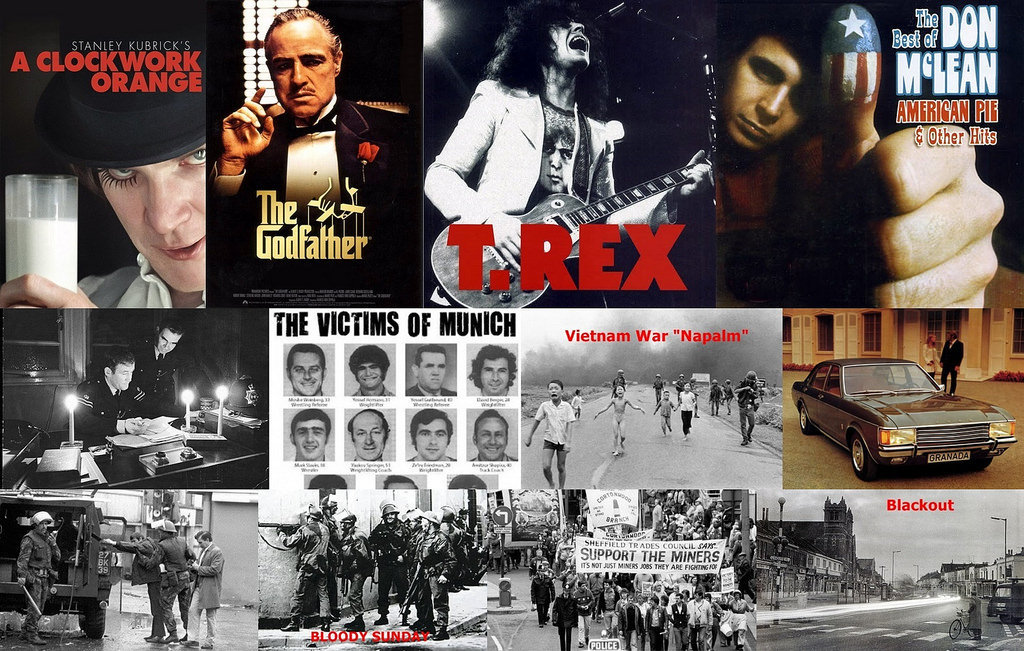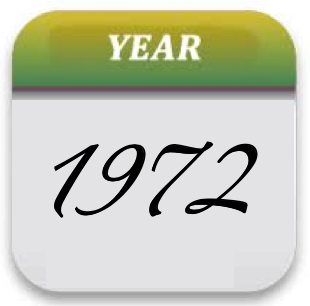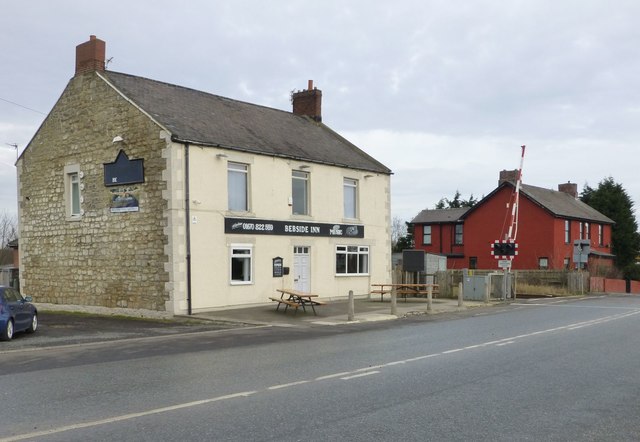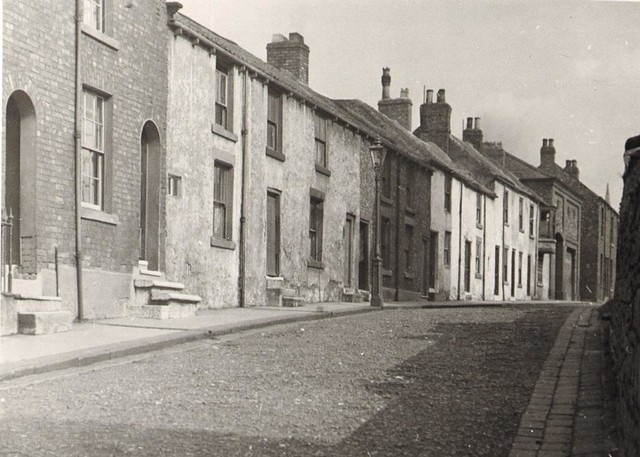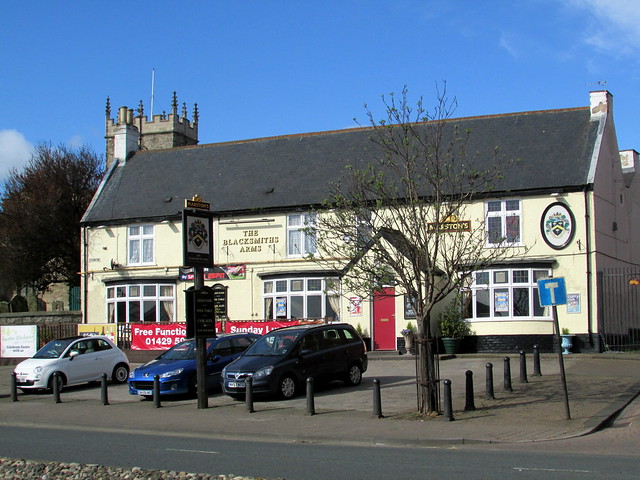That Was the Year That Was - 1972

-
Description
1972 This year is marked as a black year in history due to the use of terrorism entering sport with the massacre of 11 Israel Athletes by Arab Gunman. Also this is the beginning of the biggest political scandal in modern times and the start of the Watergate Scandal. On the other side of the Atlantic a worsening of the problems between the IRA and the British government see wrongs from both sides and innocent lives are lost. On June 8th 1972 Kim Phuc's village in Vietnam was bombed with napalm. The photograph of her, running burned and crying away from the attack, became one of the iconic images of the Vietnam War…Despite the gloom, popular culture showed signs of shaking off its late 1960s malaise, and new styles and trends began to emerge. On the music front, 1972 saw the Rolling Stones tour the US, while Elton John's Rocket Man, Don McLean's American Pie, Neil Young's Heart of Gold and Al Green's Let's Stay Together were all major hits. Britain was in the grip of glam rock: T-Rex's Metal Guru and Slade's Mama Weer All Crazee Now both topped the charts. The first Mr Men children's books appeared in 1972, and the Volkswagen Beetle became the world's biggest selling car. Fashions of 1972 included bell bottoms, cheesecloth shirts and platform shoes, while women had a choice of mini, midi or maxi skirts. In cinema, A Clockwork Orange received its premiere - but was withdrawn a year later by director Stanley Kubrick, who feared that the film might inspire violence similar to that it depicted. Francis Ford Coppola's The Godfather was also released, while Burt Reynolds and Jon Voight starred in the famously creepy adventure/horror epic, Deliverance. Technological advances of 1972 included the commercial launch of the pocket calculator, an offshoot of the Apollo moon landings programme, and the appearance of "Pong", the first home video game. Other commercial ventures of 1972 included the launch of Nike running shoes, while Dr Alex Comfort's famous 'The Joy Of Sex' hit bookshelves, going on to sell millions of copies worldwide. 1972 UK Miners Strike Coal miners walked out at midnight in their first national strike for almost 50 years. Three months of negotiations with the National Coal Board ended in deadlock four days ago with an offer of 7.9% on the table and the promise of a backdated deal for an increase in productivity. The 280,000 mineworkers signalled their determination to break the Government's unofficial eight per cent pay ceiling by refusing to put the offer to the vote. They are looking for an increase of up to £9 a week - on an average take home wage of £25. Yesterday, the NCB announced it was withdrawing its pay offer as it became clear the miners were intent on striking. The British government declares a state of emergency over 47 day miners' strike Blackouts will total nine hours daily The Central Electricity Generating Board announced last night that disconnections would increase from 10 percent to 15 per cent from this morning. The high risk areas will now spend nine hours without electricity. The industrial effects of the miners' stoppage became graver yesterday. As the miners presented their case to the Wilberforce inquiry and the Prime Minister called in both sides of industry for consultations, the number of workers made idle by the power crisis rose by 50 per cent. The Department of Employment estimated that 1.2 million workers were laid off during the day - half as many again as the day before - and employers were warned by the Generating Board that increases in the working hours on days when power were available could only hasten a total shutdown. Yesterday's figures mean that in the first two days of the emergency measures, the number of people unemployed in Britain has doubled. The Midlands was again badly affected by the power cuts and ICI announced that it had given a week's notice to nearly half its labour force, about 60,000 people on weekly wages. The Generating Board said that it not only had to make the rota disconnections yesterday but it had also had to reduce voltage by six per cent from lunchtime onwards. From this morning, however, high risk areas which have only been blacked out for two of the three peak periods would now lose their power for the whole risk period. The Prime Minister sought the help of the TUC to get the miners' picketing called off, but later TUC leaders reaffirmed their request to other unions not to cross the picket lines and called for practical aid for the miners. The miners' leader said that they had asked branches to stop mass picketing, but it was clear that they were concerned to avoid incidents rather than reduce the effectiveness of their action. Early in the day there were more clashes outside the Longannet power station in Fife, but the number of pickets was substantially reduced later. In Leeds, the oil-fired power station Kirkstall was forced to close down after railwaymen refused to deliver supplies. Many other power stations have been forced to cut their output because of the crisis and it is fairly certain that not all of them are coal-fired. At least one other oil station has already been affected. A Generating Board statement said that 10 power stations were shut down "for the duration" by yesterday, against eight last Friday. A lot more were eking out coal supplies at lower power, and the Generating Board estimated that the Government's electricity restrictions had saved 35 per cent of coal used on Monday, compared with a week before. The Gas Council said that gas supplies were still holding up well and daily consumption had not got back to the peak reached in the January cold spell. The London Electricity Board devised an unusual way of warning consumers of impending power cuts. From yesterday afternoon it planned to interrupt power for a few seconds five minutes ahead of the rota disconnections. The Electricity Council said that only the LEB system could cope with doing this. More than 900 trains were cancelled by Southern Region and another 150 were taken off in the Glasgow area. The Westminster Bank is suspending evening opening, partly on security grounds, and the Express Dairy company announced a cut of 10 per cent in milk deliveries. 1972 Events 2. January 5th National Executive Committee of the NUM reject pay rise offer from the National Coal Board, 3. January 9th Miners go on strike for the first time since 1926. 4. January 10th - February 9th Miners begin by picketing coal power stations and then escalate to all power stations, steelworks, ports, coal depots and other major coal users. 5. February 9th British Conservative Government under Prime Minister Edward Heath declares a state of emergency. 6. February 9th British Government announces 3 day working week introduced to save electricity. 7. February 19th New wages agreement reached between the National Executive Committee of the NUM and the Government. 8. February 28th Following ballot of NUM Union Members Miners accept agreement and return to work. Following the settlement the miners wages increased significantly and two years later called a further strike. Northern Ireland Bloody Friday 22 bombs explode in Belfast Ireland and 9 people are killed with a further 130 seriously injured. Bloody Sunday unarmed Catholic protesters are gunned down by the British Army on bloody Sunday. IRA bomb explodes at the 16th Parachute Brigade headquarters at Aldershot. CND ( Campaign for Nuclear Disarmament ) organises a series of demonstrations against nuclear arms After spending 20 years fighting in the courts for compensation 300 Thalidomide victims are offered £11.85 million over 10 years. UK unemployment rises to one million for the first time since the depression years of the 1930s. 9 January – The National Union of Mineworkers held a strike ballot in which 58.8% voted in favour. Coal miners begin a strike which lasts for seven weeks, including picketing of Saltley coke depot in Birmingham. 20 January – Unemployment exceeded 1,000,000 for the first time since the 1930s almost double the 582,000 who were unemployed when Edward Heath's Conservative government came to power less than two years ago. 20 January – The premiere of Pink Floyd's Dark Side of the Moon at The Dome, Brighton, is halted by technical difficulties. Dark Side of the Moon would be played in its entirety the following night, but it would be a full year before the album was released. 21 January - Keith Richards jumps on stage to jam with Chuck Berry at the Hollywood Palladium, but is ordered off for playing too loud. Berry later claims that he did not recognize Keith and would not have booted him if he did. 30 January – 'Bloody Sunday' in Northern Ireland: fourteen killed when troops open fire on demonstrators in Derry. 2 February – Protesters burned down the British Embassy in Dublin. 3 – 13 February – Great Britain and Northern Ireland competed at the Winter Olympics in Sapporo, Japan, but do not win any medals. 9 February – A State of emergency was declared as a result of the miners' strike. 9 February – Paul McCartney's new band, Wings, make their live debut at the University of Nottingham. It is McCartney's first public concert since The Beatles' 1966 US tour. 13 February – Led Zeppelin's concert in Singapore is cancelled when government officials will not let them off the airplane because of their long hair. 19 February - Paul McCartney's single "Give Ireland Back to the Irish" (which was inspired by the "Bloody Sunday" massacre in Ireland on 30 January 1972) is banned by the BBC. 22 February – An Official Irish Republican Army bomb killed six people in the Aldershot Barracks bombing. 25 February – The miners' strike ended after seven weeks. March – Ford announces its new Granada model, available as a saloon, coupé or estate car, which will be built at the Dagenham plant in England as well as the Cologne plant in West Germany. It is designed to compete with the likes of the Rover P6 and Vauxhall Victor, and on the continent it will be sold as the Ford Consul. 21 March – Chancellor Anthony Barber announced a £1.2 billion tax reduction in the Budget. 25 March – The 17th Eurovision Song Contest is held in the Usher Hall, Edinburgh, Scotland. The only time (as of 2012) Scotland hosted the contest. 26 March – The UK's last trolleybus system, in Bradford, closed. 30 March – The Troubles: The Parliament of Northern Ireland was suspended. 31 March – A CND demonstration was held protesting against the nuclear base at Aldermaston. 1 April – William Whitelaw was appointed as the first Northern Ireland Secretary. 16 April – Electric Light Orchestra make their live debut at the Fox and Greyhound pub in Park Lane, Croydon, England. 19 April – A report into the Bloody Sunday shootings by the Lord Chief Justice, Lord Widgery, exonerated the British troops of blame because the demonstration had been illegal. 30 April – The Brighton Belle Pullman car train made its last journey from London to Brighton. 2 May – Stone the Crows lead guitarist Les Harvey is electrocuted on stage during a show in Swansea, Wales, by touching a poorly connected microphone. Harvey died in a hospital a few hours later. The band's lead singer, Maggie Bell, Harvey's longtime girlfriend, was also hospitalized, having collapsed on stage after the incident. 3 May - In the first UEFA Cup final, Tottenham Hotspur beat Wolverhampton Wanderers 2-1 in the first leg at the Molineux. The General Synod of the Church of England failed to agree union with the Methodist Church. 6 May – Leeds United won the FA Cup for the first time with a 1-0 win over last year's winners Arsenal at Wembley Stadium. The only goal is a header by Allan Clarke from a Mick Jones pass. 9 May – Derby County won the Football League First Division title for the first time in their history. 17 May – Tottenham Hotspur completed a 3-2 aggregate win over Wolverhampton Wanderers at White Hart Lane to win the first UEFA Cup. 18 May - Queen Elizabeth last met her uncle, Edward, Duke of Windsor, at his Paris home. Four troopers of the Special Air Service and Special Boat Service were parachuted onto the ocean liner Queen Elizabeth 2 1,000 miles (1,600 km) across the Atlantic after a bomb threat and ransom demand which turned out to be bogus. 22 May – The Dominion of Ceylon became the republic of Sri Lanka. 24 May - The final stretch of the M6 motorway opened between junctions 6 (Spaghetti Junction) and 7 north of Birmingham, with the fully operational motorway stretching more than 200 miles from Rugby to Carlisle, more than a decade after the first sections were opened. Glasgow Rangers F.C. won the UEFA Cup Winners' Cup, defeating FC Dynamo Moscow 3-2 in the final at Camp Nou in Barcelona (Spain). A pitch invasion by their supporters led to the team being banned from defending the trophy the following season. 26 May – The state-owned travel firm Thomas Cook & Son was privatised. 28 May – Edward, Duke of Windsor, died of cancer in France at the age of 77, 35 years after his abdication as king. 30 May – Official Irish Republican Army declared a cease fire in Northern Ireland. 1 June – Hotels and boarding houses became required to obtain certification under the Fire Precautions Act 1971. Premiere of Harrison Birtwistle's The Triumph of Time in London. 3 June – A Protestant demonstration in Derry turned into a battle. 5 June – The funeral of The Duke of Windsor (formerly Edward VIII) is held at Windsor Castle. 18 June – British European Airways Flight 548 crashed near Staines and 118 people are killed, making it the UK's worst air disaster at this date. The only two survivors are both dead by the time they reach hospital. 23 June – The Chancellor of the Exchequer Anthony Barber announced a decision to float the Pound. 1 July – The first official gay pride march in London was held. 12 July - first performance of Peter Maxwell Davies's opera Taverner at the Royal Opera House. 21 July – Bloody Friday: Nine people died and over a hundred were injured in a series of IRA explosions in Belfast city centre. 28 July – A strike by thousands of dockers led to the government announcing a state of emergency on 4 August. 31 July – The Troubles in Northern Ireland: Operation Motorman, 4:00 AM: British Army began to regain control of the "no-go areas" established by Irish republican paramilitaries in Belfast, Derry and Newry. Claudy bombing ("Bloody Monday"), 10:00 AM: Three car bombs in Claudy, County Londonderry, killed nine. It became public knowledge only in 2010 that a local Catholic priest was an IRA officer believed to be involved in the bombings but his role was covered up by the authorities. 6 August – Idi Amin, dictator of Uganda, announced that 50,000 Asians with British passports are to be expelled from Uganda to Britain within the next three months as they are "sabotaging the Ugandan economy". 9 August – The Tim Rice and Andrew Lloyd Webber musical Jesus Christ Superstar made its West End debut. 26 August –10 September – Great Britain and Northern Ireland competed at the Olympics in Munich, West Germany, and win 4 gold, 5 silver and 9 bronze medals. 28 August – Prince William of Gloucester, a cousin of the Queen, is killed in an air crash near Wolverhampton. He was 30 years old, a bachelor and ninth in line to the throne. 1 September – Raising of school leaving age in England and Wales to 16 for pupils leaving school at the end of the academic year began. Many temporary new buildings were erected in secondary modern and comprehensive schools to accommodate the older pupils, while some authorities raised the secondary school transfer age from 11 to 12 or 13. 11 September – The BBC quiz programme Mastermind was first broadcast. 12 September – The sinking of two British trawlers by an Icelandic gunboat triggered the second Cod War. 13 September – Hypermarkets make their debut in the United Kingdom some twenty years after debuting in France, when French retail giant Carrefour opens a hypermarket in Caerphilly, South Wales. 18 September – Thousands of Ugandan Asians arrived in Britain after being expelled by Idi Amin. 19 September – A parcel bomb killed a diplomat at the Israeli embassy in London. Three previously all-male Colleges of the University of Cambridge admitted women undergraduates. The lifting of restrictions on broadcasting hours permits extension of daytime television. 10 October – John Betjeman was appointed Poet Laureate. 13 October – Bank rates were abolished and replaced with the Minimum Lending Rate. 16 October – The first episode of Emmerdale Farm, a soap opera set in rural Yorkshire, was aired on ITV. 19 October – Royce Ryton's play about the Abdication Crisis of Edward VIII, Crown Matrimonial, premiered at the Theatre Royal, Haymarket, London, for the first time includes the portrayal of a living member of the Royal Family (Queen Elizabeth The Queen Mother as Duchess of York) on the legitimate stage. 22 October – Gordon Banks, the England national football team goalkeeper, suffered a serious eye injury in a car crash in Staffordshire. 23 October – Access credit cards were introduced. 6 November – The government introduced price and pay freezes to counter inflation. 18 November – England women's national football team played its first official association football match, against Scotland in Greenock, 100 years after the equivalent men's match. 10 December - John Hicks was awarded the Nobel Prize in Economics with Kenneth Arrow for "pioneering contributions to general economic equilibrium theory and welfare theory." Rodney Robert Porter won the Nobel Prize in Physiology or Medicine jointly with Gerald Edelman "for their discoveries concerning the chemical structure of antibodies". Inflation falls slightly during the year to 6.4% from 8.6%.[38] Marriage rates peak. Crown Court established by the Courts Act 1971 to replace the courts of Assize and Quarter Sessions in England and Wales. Property qualifications requiring jurors to be householders are abolished. United Reformed Church formed by merger of most of the Congregational Church in England and Wales with the Presbyterian Church of England. Honda, the Japanese manufacturer whose motorcycles are already popular with British buyers, begins importing passenger cars to the United Kingdom, beginning only with its small Civic hatchback - one of the first medium sized cars sold in Europe to feature this bodystyle - which competes with similar sized saloons including the Ford Escort. A larger hatchback and saloon model is due within the next four years to compete with the likes of the Ford Cortina. British car production peaks at more than 1.9 million units, despite regular strikes and increasing foreign competition. Japanese car-maker Nissan enjoys a surge in sales, with more than 30,000 cars sold in Britain this year compared to just over 6,000 in 1971. TV Events 4 April - After a three-year courtship, Emily Nugent marries Ernest Bishop on Coronation Street. The first edition of John Craven's Newsround, a news programme for younger viewers, airs on BBC1. 24 July – The Independent Television Authority (ITA) is renamed the Independent Broadcasting Authority (IBA). 8 September – The Pilot episode of Are You Being Served is aired on BBC1. The programme returns for a regular series in 1973. 11 September – First broadcast of the BBC quiz programme Mastermind. October – The lifting of restrictions on broadcasting hours permits extension of daytime television. 16 October – The first episode of Emmerdale Farm is aired by Yorkshire Television. Originally conceived and broadcast as a daytime programme in an afternoon slot, it is rescheduled to an evening slot in 1978. 23 October – The BBC announces that development work has begun on the Ceefax teletext service. The first BBC film programme Film '72 hosted by Barry Norman is aired. The show's title is updated annually, but is collectively referred to as "The Film Programme". The BBC broadcasts Ways of Seeing, a four-part series by John Berger on art. BBC1 10 March – The Brothers (1972–1976) 4 April – Newsround (1972–present) 8 September – Are You Being Served? (1972–1985) 11 September – Mastermind (1972–present) 28 September – War and Peace (1972–1973) 19 October – Colditz (1972–1974) 16 November – The Film Programme (1972–present) 15 December – Record Breakers (1972–2001) Unknown – Pebble Mill at One (1972–1986) ITV 13 April – Love Thy Neighbour (1972–1977) 14 April – Clapperboard (1972–1982) 1 September – Rainbow (1972–1991, 1994–1995) 13 September – Van der Valk (1972–1973, 1977, 1991–1992) 29 September – The Protectors (1972–1974) 1 October – Weekend World (1972–1988) 16 October – Emmerdale Farm (1972–present) 11 October – Crown Court (1972–1984) 19 October – General Hospital (1972–1979) 6 December – Arthur of the Britons (1972–1973) Top records 1972 "I'd Like to Teach the World to Sing (In Perfect Harmony)" - The New Seekers "Telegram Sam" - T. Rex "Son of My Father" - Chicory Tip "Without You" - Nilsson "Amazing Grace" - The Pipes and the Drums and the Military Band of the Royal Scots Dragoon Guards "Metal Guru" - T. Rex "Vincent" - Don McLean "Take Me Bak 'Ome" - Slade "Puppy Love" - Donny Osmond "School's Out" - Alice Cooper "You Wear It Well" - Rod Stewart "Mama Weer All Crazee Now" - Slade "How Can I Be Sure" - David Cassidy "Mouldy Old Dough" - Lieutenant Pidgeon "Clair" - Gilbert O'Sullivan "My Ding-a-Ling" - Chuck Berry "Long Haired Lover from Liverpool" Little Jimmy Osmond Popular Films The Godfather Fiddler on the Roof Diamonds Are Forever What's Up, Doc? Dirty Harry The Last Picture Show A Clockwork Orange Cabaret Popular Musicians and songs ABBA Roxy Music The Eagles John Lennon Paul Simon Simon and Garfunkel Rod Stewart Don Mclean with " American Pie " Michael Jackson with " Ben " Don McLean Elton John The Moody Blues David Bowie Led Zeppelin Popular TV Programmes Monty Python's Flying Circus Sesame Street The Benny Hill Show The Brady Bunch Dad's Army Hawaii Five-O Here's Lucy -
Owner
brizzle born and bred -
Source
Flickr (Flickr) -
License
What does this mean? Attribution-NonCommercial-ShareAlike License
-
Further information
Link: https://www.flickr.com/photos/20654194@N07/17595431631/
Resource type: Image
Added by: Peter Smith
Last modified: 7 years, 11 months ago
Viewed: 1196 times
Picture Taken: 2015-05-13T11:27:10 -
Co-Curate tags
